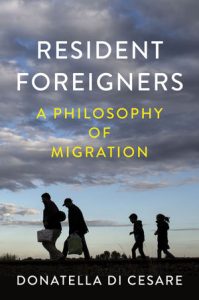Resident Foreigners: A Philosophy of Migration

Author: Donatella di Cesare
Publisher: Polity Books
Year of Publication: 2020
Print Length: 260 pages
Genre: Non-Fiction / Philosophy
Area: Athens (Greece), Rome (Italy), Jerusalem (Palestine), Lampedusa (Italy)
Topic: Ethics & Morality, Refugees & Forced Migration, Migration, Migrants, Migrant/Foreign Workers, Resident Foreigner, Mobility & Immobility, Citizenship, Politics & Power, Freedom to Move and to Stay, Movement of People and Ideas, Transit, Limbo, Hospitality, Community, Social Cohesion, Ownership, Justice, Sovereignty; Self-Determination, Autonomy, Agency; Threat, Persecution, Famine, Civil War, War, Human Rights; Passport, ID, and Identification; Deportation, Exile, Smuggling & Trafficking, Legality & Illegality, Receiving Country, Us vs Them Mentality, Camps, Refugee Urban Settlement; Modernity, Modernism, Modern; Western Liberalism, Chauvinism, Cosmopolitanism
From the shores of Europe to the Mexican-US border, mass migration is one of the most pressing issues we face today. Yet at the same time, calls to defend national sovereignty are becoming ever more vitriolic, with those fleeing war, persecution, and famine vilified as a threat to our security as well as our social and economic order.
In this book, written amidst the dark resurgence of appeals to defend ‘blood and soil’, Donatella Di Cesare challenges the idea of the exclusionary state, arguing that migration is a fundamental human right. She develops an original philosophy of migration that places the migrants themselves, rather than states and their borders, at the centre. Through an analysis of three historic cities, Athens, Rome and Jerusalem, Di Cesare shows how we should conceive of migrants not as an other but rather as resident foreigners. This means recognising that citizenship cannot be based on any supposed connection to the land or an exclusive claim to ownership that would deny the rights of those who arrive as migrants.
Instead, citizenship must be disconnected from the possession of territory altogether and founded on the principle of cohabitation – and on the ultimate reality that we are all temporary guests and tenants of the earth.
Di Cesare’s argument for a new ethics of hospitality will be of great interest to all those concerned with the challenges posed by migration and with the increasingly hostile attitudes towards migrants, as well as students and scholars of philosophy and political theory.
Table of Contents
Introduction: In short
1. Migrants and the State
1. Ellis Island / 2. If the migrant unmasks the state / 3. The state-centric order / 4. A fundamental hostility / 5. Beyond sovereignty: a marginal note / 6. Philosophy and migration / 7. A shipwreck with an audience: on today’s debate / 8. Thinking from the shore / 9. Migration and modernity / 10. Columbus and the image of the globe /
11. ‘We refugees’: The scum of the Earth / 12. What rights for the stateless? / 13. The frontier of democracy / 14. The sovereigntism of closed borders / 15. Philosophers against Samaritans / 16. The primacy of citizens and the dogma of self-determination / 17. If the state is a club: liberalism based on exclusion / 18. The defence of national integrity / 19. Owning the land: a baseless myth / 20. Freedom of movement and birthright privilege /
21. Migrants against the poor? Welfare chauvinism and global justice / 22. Neither exodus, nor ‘deportation’, nor ‘human trafficking’ / 23. Jus migrandi: For the right to migrate / 24. Mare liberum and the sovereign’s word / 25. Kant, the right to visit and residency denied
2. The End of Hospitality?
1. The continent of migrants / 2. ‘Us’ and ‘them’: The grammar of hatred / 3. Europe, 2015 / 4. Hegel, the Mediterranean and the cemetery of the sea / 5. Fadoul’s story / 6. ‘Refugees’ and ‘migrants’: Impossible classifications / 7. The metamorphoses of the exile / 8. Asylum: from ambiguous right to a dispositif of power / 9. ‘You’re not from here’” An existential negation / 10. The migrant’s original sin /
11. ‘Illegals’: being condemned to invisibility / 12. Terms of domination: ‘integration’ and ‘naturalization’ / 13. When the immigrant remains an émigré / 14. The foreigner who lives outside, the foreigner who lives within / 15. Clandestine passages, heterotopias, anarchic routes
3. Resident Foreigners
1. On exile / 2. Neither rootlessness or wandering / 3. Phenomenology of habitation / 4. What does it mean to migrate? / 5. The global uprooting / 6. ‘The earth-born’: Athens and the myth of autochthony / 7. Rome: the city without origin and the imperial citizenship / 8. The theological-political charter of the ger / 9. Jerusalem, The city of foreigners / 10. On return.
4. Living Together in the New Millennium
1. The new age of walls / 2. Lampedusa: of what border is it the name? / 3. Condemned to immobility / 4. The world of the camps / 5. The passport, a paradoxical document / 6. ‘To each their own home!’ Crypto-racism and the new Hitlerism / 7. Hospitality: in the impasse between ethics and politics / 8. Beyond citizenship / 9. The limits of cosmopolitanism / 10. Community, immunity, welcome /
11. When Europe is drowned… / 12. The power of place / 13. What does cohabitating mean? / 14. Resident foreigners
Notes

Donatella di Cesare works at the Department of Philosophy, Sapienza University in Rome. She does research in Theoretical Philosophy, Political Philosophy. Her most recent publications are “Resident Foreigners. A Philosophy of Migration” and “Virus sovrano. L’asfissia capitalistica”. One of the most significant voices on the Italian intellectual scene, she is an authoritative contributor to numerous newspapers, websites and journals in Italy and elsewhere. Her books have been translated into eight languages.
Source: https://mitpress.mit.edu/author/donatella-di-cesare-24843/ & https://www.researchgate.net/profile/Donatella-Di-Cesare
More from Donatella di Cesare in this library, click here.
